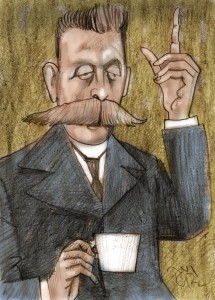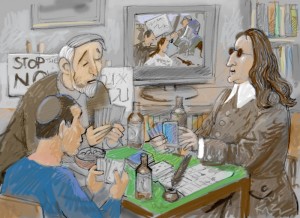Haim Watzman
Herzl carefully adjusted his mouse-gray gloves and followed the young secretary through a massive door held open by a uniformed footman.
“Mr. Herzl, Your Excellency,” the secretary said crisply, standing as stiff as a sentry at a military tomb.

illustration by Avi Katz
The man at the desk carefully penned notes in the margins of a document. His desk testified to his assiduous and deliberate character. Dossiers and documents were piled to the Interior Minister’s left, a large brass telephone with a wooden housing stood at his right hand. In front of him, partly blocking Herzl’s view of his host’s gray head, were the gilded accoutrements of a high imperial official—two tall candlesticks, two inkwells, a paperweight in the shape of a crouching lion, and a small, triumphant angel that served, it seemed, as a pen stand. All were carefully polished; they glinted in dappled August sunlight that filtered in through the oak outside a north-facing bay window. Behind the desk hung a large portrait of Czar Alexander III and a smaller icon of St. Mary Magdalene. Herzl felt faint and his beard itched. But he steeled himself.











